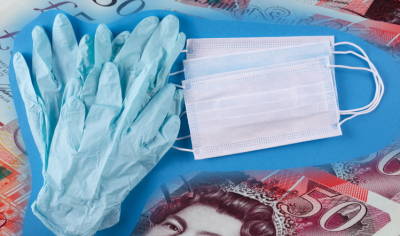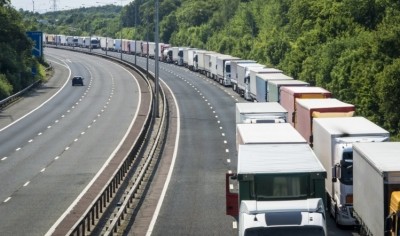Food supply worries persist over French border delays

France closed its UK border to all travel, including freight, on Sunday in an effort to curb the spread of a new variant of coronavirus. More than 50 other countries also banned UK arrivals.
Rail, air and sea services resumed from Wednesday morning, with all those travelling from the UK into France required to show proof of a negative coronavirus test taken within the previous 72 hours.
French citizens, British nationals living in France and hauliers are among those now able to travel, providing they have a recent negative test.
At the time of the reopening, there were around 4,000 lorries stuck in Kent waiting to cross the channel. The backlog is expected to take several days to clear.
NHS Test and Trace staff have been despatched to carry out rapid tests on stranded drivers, with assistance from the army.
Grant Shapps, the UK transport secretary, urged lorry drivers not to head towards Channel ports hoping to board ferries or trains, despite the reopening of the border.
Brexit warning
On Tuesday the European Commission advised its 27 member states to discontinue bans on flights and trains from the UK and to reopen freight routes to “ensure supply chains continue to function”.
The commission said UK nationals retained the right to free movement within the European Union until 1 January 2021 and that they “should be exempted from further temporary restrictions provided that they undergo a test of quarantine”.
The EU executive branch added that cargo flows “need to continue uninterrupted”, but warned that at the end of the Brexit transition period on 31 December, only “essential” travel will be permitted unless member states add the UK to a list of countries which are exempt from restrictions.
Shortages likely
Ian Wright, CEO of the Food and Drink Federation (FDF), warned that the border disruption is likely to result in shortages of certain foods and ingredients available for retail and production.
“Even working extremely quickly and with Calais possibly shut for Christmas Day it is clear that it could take until the New Year to return to normal operations,” he said.
“Lorries will take time to return to their normal pattern of collection and delivery. That means we are likely to see, locally, reduced on-shelf availability of some fresh vegetables and fruits, beginning next week. We will also see potential significant disruption to the flow of ingredients into the UK.
“Though all in the industry are already working hard to mitigate any impact for shoppers they are almost certain to be impacts across the supply chain,” Wright added.
Call for compensation
The FDF chief also called on the government to compensate losses sustained by the food industry as a result of the border closure.
“Many businesses have lost very valuable, but uninsurable, consignments in these delays through no fault of their own,” said Wright. “They will note that compensation is being offered to those who had to cancel domestic train journeys as a consequence of the Tier 4 announcements.
“Ministers have a moral duty to offer those who have lost product nothing less.”
Livelihoods at risk
Seafood Scotland said the French border closure could not have come at a worse time for the Scottish seafood industry, as many companies were depending on this week to replenish financial reserves before disruption from Brexit. It warned that “businesses and livelihoods are at immediate risk”.
Donna Fordyce, chief executive of Seafood Scotland, said: “The seafood sector is hanging by a thread, and this latest blow is beyond devastating.
“Traditionally, 21 and 22 December are the busiest days of every year, as Europe enjoys premium seafood as part of their Christmas Eve celebrations – this week was to be the shining light between an horrendous 2020 and a looming Brexit transition. Many companies have been working flat out for a week to fulfil massive orders from Europe.
“Much of the seafood to fulfil these huge orders has been caught or landed and is either on the road or was about to be,” Fordyce added.
“Seafood companies and processors have purchased millions of pounds worth of catch for orders that won’t now see the market and being highly perishable – it can’t be shelved, or stockpiled. The companies will take the hit of the spoiled goods, and some may not survive long enough to see whether insurance pays out.”
Brexit preparations
Fordyce also said the events had “really brought home the urgent need for more time to prepare for Brexit”.
“A grace period for checks and new paperwork would be enormously welcomed,” she said. “In 24 hours, everything has changed and if the industry doesn’t get help now, the wider consequences could be dire.”
Recent analysis by law firm Irwin Mitchell revealed that company bosses “are expected to read the equivalent of Tolstoy’s epic novel War & Peace in order to get themselves up to speed with the government’s Brexit rules”.
















